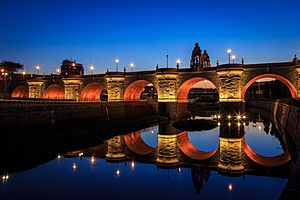Bridge of Toledo (Madrid) facts for kids
Quick facts for kids Bridge of Toledo |
|
|---|---|
| Native name Spanish: Puente de Toledo |
|

The bridge of Toledo at night (2013)
|
|
| Location | Madrid, Spain |
| Built | 1732 |
| Architect | Pedro de Ribera |
| Architectural style(s) | Baroque |
| Official name: Puente de Toledo | |
| Type | Non-movable |
| Criteria | Monument |
| Designated | 1956 |
| Reference no. | RI-51-0001257 |
| Lua error in Module:Location_map at line 420: attempt to index field 'wikibase' (a nil value). | |
The Bridge of Toledo (in Spanish: Puente de Toledo) is a beautiful and historic bridge located in Madrid, Spain. It was built in a fancy style called Baroque between 1718 and 1732. This amazing bridge crosses the Manzanares River. It connects the Pyramids roundabout on the east side with Marqués de Vadillo Square on the west side of the city.
Contents
The Amazing Bridge of Toledo
The Bridge of Toledo is one of Madrid's most famous landmarks. It's not just a way to cross the river; it's also a piece of art and history. Imagine how many people have walked or ridden across it over hundreds of years!
What is the Bridge of Toledo?
The Bridge of Toledo is a very old stone bridge in Madrid. It was designed by a famous architect named Pedro de Ribera. The bridge has many arches and is decorated with statues. It helps people travel between different parts of the city, making it an important part of Madrid's history and daily life.
Building a Masterpiece
Construction on the Bridge of Toledo started in 1718 and finished in 1732. This means it took 14 years to build! The architect, Pedro de Ribera, used the Baroque style. This style is known for being very grand, detailed, and dramatic. You can see this in the bridge's many arches and the way it is decorated.
The bridge was built to connect the city center with areas across the Manzanares River. This helped Madrid grow and made it easier for people and goods to move around.
Protecting History
Because of its beauty and importance, the Bridge of Toledo was declared a Bien de Interés Cultural in 1956. This Spanish term means "Property of Cultural Interest." It's like saying the bridge is a very important historical monument that needs to be protected. This special status helps make sure the bridge stays safe and well-preserved for future generations to enjoy.
Gallery
-
Statue of Isidore the Laborer
-
Statue of Maria Torribia
See also
 In Spanish: Puente de Toledo para niños
In Spanish: Puente de Toledo para niños
 | Sharif Bey |
 | Hale Woodruff |
 | Richmond Barthé |
 | Purvis Young |




